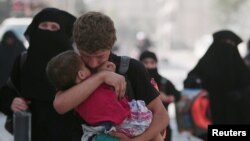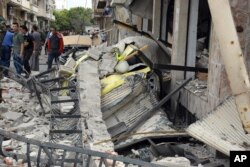The Commission of Inquiry on Syria finds civilians and civilian infrastructure continue to be deliberately targeted by the warring factions, with complete disregard for international law that calls for the protection of civilians in conflict.
The commission calls the establishment of de-escalation zones a step in the right direction. It says these zones agreed to by Russia, Iran and Turkey have resulted in a reduction in violence around Idlib and western Aleppo.
But, it adds, hostilities continue unabated in the de-escalation zones around Homs, Damascus and southern Daraa.
"Whether it be the unrestrained use of airstrikes against residential neighborhoods, attacks against doctors and hospitals, or the use of suicide bombers that deliberately target civilians, fighting remains brutal in purpose and reprehensible in method," said the commission's chair, Paulo Pinheiro.
Pinheiro says the de-escalation zones have not improved the delivery of humanitarian aid. He says the United Nations has been permitted to make just one delivery of food, medicine and other assistance this year.
The situation is even worse outside the few de-escalation zones. For example, he notes, the battle to retake Raqqa from Islamic State is heating up, resulting in a staggering loss of civilian life.
Pinheiro says the commission has documented what he calls a catalog of horrors committed during more than six years of civil war, and the perpetrators of the crimes must be held accountable.
"Genocide, crimes against humanity, war crimes, blatant violations of abuses of human rights law, and continuous, willful violations of international humanitarian law, this lack of respect for international norms, and basic notions of humanity, must not continue to go unaddressed," he said.
Members of the Commission of Inquiry are calling for the warring parties to work for an inclusive political settlement. They say this is the only long-term hope to end the conflict, which has killed hundreds of thousands of people and displaced millions more.





